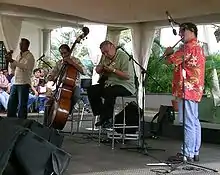Ensamble Gurrufío
The Ensamble Gurrufío is a quartet dedicated to the research, arrangement and reinterpretation of Venezuelan instrumental music. The group has won multiple awards both nationally in its native country of Venezuela and internationally.[1]
Ensamble Gurrufío | |
|---|---|
 (left-right) Juan Ernesto Laya, David Peña, Cheo Hurtado, and Luis Julio Toro. | |
| Background information | |
| Origin | Caracas, Venezuela |
| Genres | Venezuelan folk music |
| Years active | 1984–present |
| Labels | Sony Music, Independent |
| Associated acts | Serenata Guayanesa, Camerata Criolla, Great Marshal of Ayacucho Symphony orchestra, Moisés Torrealba, Alexis Cárdenas, Ofelía del Rosal |
| Website | www.ensamblegurrufio.com.ve |
| Members | Cheo Hurtado Manuel Rojas David Peña Juan Ernesto Laya |
| Past members | Cristobal Soto Luis Julio Toro |
History
The Ensamble Gurrufío was founded on 1984 by three young musicians, Luis Julio Toro (flute), Cristóbal Soto (mandolin), and Cheo Hurtado (cuatro).[2] David Peña (bass) completed the quartet in 1989.[2] All four are academic musicians and teachers with considerable background as soloists and performers.[2] A fifth member, Juan Ernesto Laya (maracas), joined the ensemble since 1998, when Cristóbal Soto moved to a permanent residence in France. The group has occasionally incorporated additional members, such as Jaime Martínez (oboe) and Moisés Torrealba (bandola).
The ensemble has performed in collaboration with other Venezuelan groups, such as Serenata Guayanesa, the Camerata Criolla, and the Grand Marshal of Ayacucho Symphony Orchestra. Similarly, they have recorded together with foreign musicians like Bela Fleck, among others. Ensemble Gurrufío has performed in over 50 countries and was the first Venezuelan instrumental group to have performed in Carnegie Hall in 1994.[3][1]
In 2012, flutist Luis Julio Toro retired to devote time to other projects and was replaced by Manuel Rojas, a flutist who performed for multiple orchestras including the Simón Bolívar Symphony Orchestra.[4]
Repertoire and Style
Their live performances and recordings are characterized by the addition of long-forgotten pieces, rescued through research and interaction with other scholars experienced in Venezuelan music. The group also performs versions of "gaitas" or traditional Venezuelan music.[2][3][5]
Reception
Music critic Alex Ross, then working for The New York Times, attended Ensamble Gurrufío's performance at Carnegie Hall in 1994, stating that the group "illustrated the merengue, the joropo, the vals and other Venezuelan dances" and described their work as "complex pieces" that were "embroidered ... with deft improvisational touches".[6]
Awards and recognition
Discography
- Maroa (1993)[8][9]
- Cruzao (1994)
- El Trabadeos (1997)
- Cosas del ayer (1998)
- Ensamble Gurrufío con la orquesta Sinfónica Gran Mariscal de Ayacucho (1999)
- Ensamble Gurrufío en vivo (1999)
- Sesiones con Moisés Torrealba (2002)
- El Reto (2004)
- Riqui, Riqui, Riqui Ran (2005)
- Sesiones con Hamilton de Holanda (2009)
- Sesiones con Alfredo Naranjo (2009)
References
- "Ensamble Gurrufío resonó en Egipto". El Impulso (in Spanish). 14 December 2013. Retrieved 23 December 2016.
- "Un cuarto de siglo del Ensamble Gurrufío". Cancioneros. Retrieved 23 December 2016.
- Escarra, Oasis. "A Full House for Ensamble Gurrufio in Washington DC". República Bolivarian de Venezuela - Embajada en EE UU. Ministerio de Poder Popular para Relaciones Exteriores. Retrieved 23 December 2016.
- Tasca, Lorena (1 November 2012). "Ensamble Gurrufío ya no contará con Luis Julio Toro en la flauta - Musica - EL UNIVERSAL". El Universal. Retrieved 23 December 2016.
- Iñiguez, Fernando (8 July 1997). "Ensamble Gurrufío, música llanera en Clamores". El País (in Spanish). Retrieved 23 December 2016.
- Ross, Alex (6 December 1994). "CRITIC'S NOTEBOOK; Tuning In to Venezuelan Music and Its Rich Tradition". The New York Times. Retrieved 23 December 2016.
- Almérida, Raquel (25 October 2016). "Noche de premios Cacique de Oro Internacional 2016: aquí los nominados". Noticias24 Carabobo (in Spanish). Retrieved 23 December 2016.
- "Ensamble Gurrufío se presentará en los próceres este domingo". Suena a Venezuela. Ministry of Popular Power for Communication and Information. Archived from the original on 23 December 2016. Retrieved 23 December 2016.
- "Ensamble Gurrufio - Bio & Discography". www.sincopa.com. Retrieved 23 December 2016.